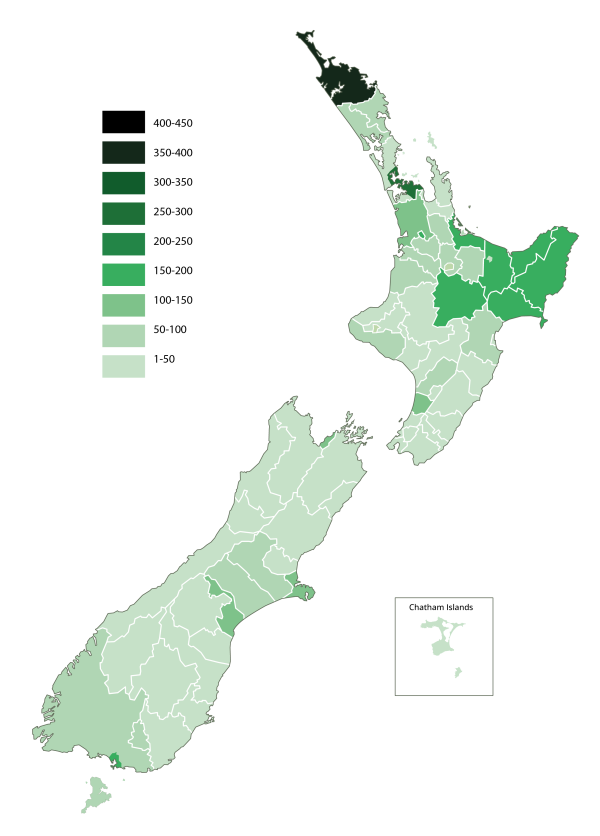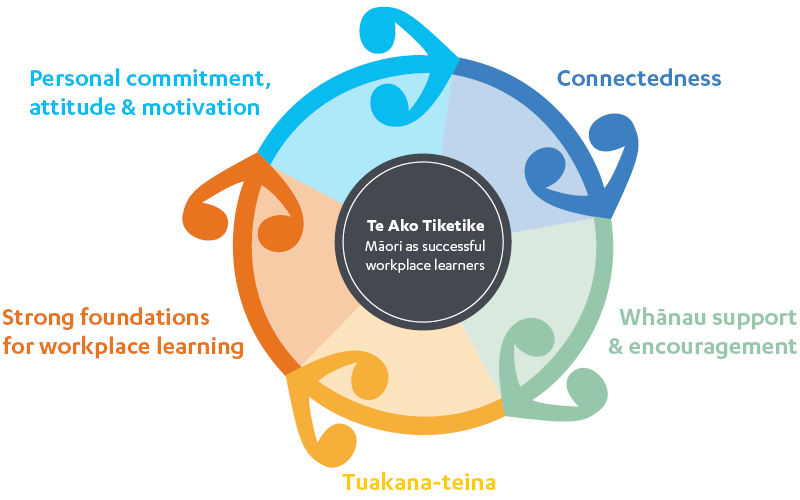- Home
- Te Ao Māori
- Mana Motuhake
Mana Motuhake
We use industry specialists, resources, and networks to respond appropriately to the needs of learners and businesses. Wherever possible, we include local mātauranga Māori (Māori knowledge) shared by whānau to provide context and a sense of legacy.
Our Māori Learners
We partner with iwi, hapu, whānau, and community groups to create training programmes that support communities to be successful.
In 2022, over 4,600 learners at Rōpū Whakangungu Ahuwhenua Ahumahi (PrimaryITO) identified as Māori.
The map below shows where Māori learners are based across the motu.

Te Ako Tiketike model
Te Ako Tiketike is a model created by Ako Aotearoa, based on research into what best supports Māori learners to be successful in workplace-based training.
Using the Te Ako Tiketike Model ensures we can contextualise work based training success.

Connectedness
Expectations are high yet realistic. Clear direction with a culturally supportive environment, easy to use resources and positive reinforcement to succeed.
Whānau support & encouragement
Alignment with community networks, iwi, hapū, whānau is key. An invitation to participate.
Tuakana-teina
Culturally competent mentors/peers who can incorporate cultural understanding, practices and values is important.
Strong foundations for workplace learning
This is a key priority area for many learners particularly for Māori. Learning materials and support resources need to reflect different styles of learning, be responsive to learning gaps with flexible assessment models for success.
Personal commitment,attitude & motivation
Individual readiness, motivation and success is dependent on the interplay of the 5 elements underpinned by the contribution, acknowledgement and investment of all involved.
Te Whakamahi Whenua
Today’s rangatahi will become tomorrow’s workforce. Giving that workforce a greater range of skills, experience, and knowledge is essential for Māori and for New Zealand’s overall economic prosperity.
Te Whakamahi Whenua industry training is a programme that provides a Kaupapa Māori context to horticulture. The programme aims to create effective pathways towards advanced trade qualifications at higher qualification levels. This enables Māori to reach their full potential by raising the skills and knowledge of the current workforce
We worked with a Māori horticulturalist to develop assessment and learning resources for the six Te Whakamahi Whenua standards in the programme.
We include Te Whakamahi Whenua standards in our Primary Industry Skills programme for horticulture. Our aim is to:
- use the context and relevance of the standards better engage Māori in primary industry training
- attract Māori, Māori school leavers, and second-chance learners to horticulture
- be part of a vocational and educational pathway that leads learners to higher-level qualifications and better employment prospects
- lift trainees’ skills so they have greater opportunities to get more highly-skilled jobs
- give graduates employment opportunities
- give learners skills they can use in the industry and in their communities, such as in their community garden or Marae garden
- align with our Strategic Plan to increase Māori engagement and success
- appeal to a wider base of businesses and learners, such as Māori trusts and community organisations.
Tuakana-teina – Māori mentors
Mentors play an important role in the success of learners. Mentoring as a concept is closely linked to traditional whānau practices and is a helpful tool in workplace settings.
Our mentoring programme embraces tuakana-teina – a relationship where someone with the skills and knowledge in a field can support another person to grow and learn.
Mentors are generous people who offer a wealth of knowledge, skills and experience to share with trainees across all vocational pathways.
Support For Learners
For more detail on support available to learners, please click here!
